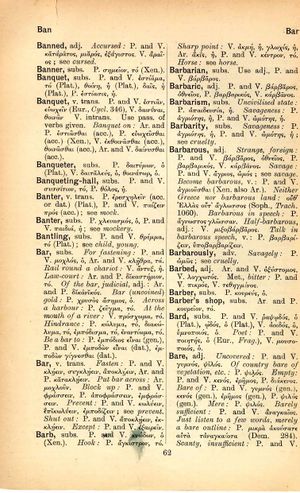banquet: Difference between revisions
From LSJ
βωμὸν Ἀριστοτέλης ἱδρύσατο τόνδε Πλάτωνος, ἀνδρὸς ὃν οὐδ' αἰνεῖν τοῖσι κακοῖσι θέμις → Aristotle had this altar of Plato set up — Plato, a man whom the wicked dare not even mention in praise
(CSV3) |
m (Woodhouse1 replacement) |
||
| Line 1: | Line 1: | ||
{{Woodhouse1 | {{Woodhouse1 | ||
|Text=[[File:woodhouse_62.jpg|thumb|link={{filepath:woodhouse_62.jpg}}]] | |Text=[[File:woodhouse_62.jpg|thumb|link={{filepath:woodhouse_62.jpg}}]] | ||
===substantive=== | |||
P. and V. [[ἑστίαμα]], τό ( | [[prose|P.]] and [[verse|V.]] [[ἑστίαμα]], τό ([[Plato]]), [[θοίνη]], ἡ ([[Plato]]), [[δαῖς]], ἡ ([[Plato]]). [[prose|P.]] [[ἑστίασις]], ἡ. | ||
===verb transitive=== | |||
P. and V. ἑστιᾶν, εὐωχεῖν (Eur., '' | [[prose|P.]] and [[verse|V.]] [[ἑστιᾶν]], [[εὐωχεῖν]] ([[Euripides|Eur.]], ''[[Cyclops]]'' 346), [[verse|V.]] [[δαινύναι]], [[θοινᾶν]]. | ||
===verb intransitive=== | |||
Use pass. of verbs given. | |||
[[banquet on]]: [[Aristophanes|Ar.]] and [[prose|P.]] [[ἑστιᾶσθαι]] (acc.), [[prose|P.]] [[εὐωχεῖσθαι]] (acc.) ([[Xenophon|Xen.]]), [[verse|V.]] [[ἐκθοινᾶσθαι]] (acc.), [[θοινᾶσθαι]] (acc.), [[Aristophanes|Ar.]] and [[verse|V.]] [[δαίνυσθαι]] (acc.). | |||
}} | }} | ||
Revision as of 08:52, 20 May 2020
English > Greek (Woodhouse)
substantive
P. and V. ἑστίαμα, τό (Plato), θοίνη, ἡ (Plato), δαῖς, ἡ (Plato). P. ἑστίασις, ἡ.
verb transitive
P. and V. ἑστιᾶν, εὐωχεῖν (Eur., Cyclops 346), V. δαινύναι, θοινᾶν.
verb intransitive
Use pass. of verbs given.
banquet on: Ar. and P. ἑστιᾶσθαι (acc.), P. εὐωχεῖσθαι (acc.) (Xen.), V. ἐκθοινᾶσθαι (acc.), θοινᾶσθαι (acc.), Ar. and V. δαίνυσθαι (acc.).

